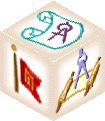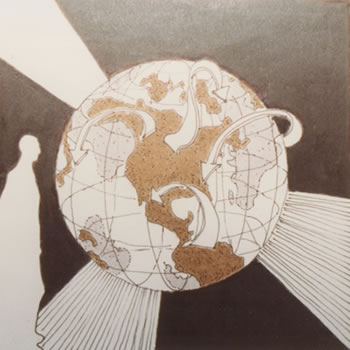The
best qualification of a prophet
is to have a good memory
Lord
Halifax
1633 - 1695
|
| One
of my strongest lifelong interests has been the creative process.
This interest has ranged from studying the dynamic in myself to
how it operates in others - both as individuals and in groups. |
For
this reason Biographies are high on my list of preferred reading.
A good biographer has to understand a complex personality, a technology
or art of some kind, the time in which the individual lived and
worked and the social economic consequences of whatever they did.
A good biography has the accuracy of a history book, reads like
a novel, delineates like a technical manual and puts it all in
psychological and philosophical context. Not an easy assignment. |
Documenting
one’s own life is even more demanding. |
As
I have stated elsewhere,
one of the principal purposes of this web site is to document
my life and times and see what value can be drawn from this one experience. To facilitate this, there are several layers of material
each providing a different perspective and cut of the information.
Each one, generally, provides a different voice and assessment.
These distinctions are not rigid, however. The web site evolves
organically. There is feedback between what is going on in my
life, information I wish to publish for some specific reason,
real-time thinking I am engaged in, and the purpose of my own
learning/understanding. |
| The
layers start with an overview composed of “To Hold...”
and an outline Resume. To
Hold deals with the idea of a life and some aspects
that come with making one that has value beyond just getting through
it. The Resume provides
a model of my major work interests and the significant events
that have happened along the way. Events that both shaped my development
and are measurement of success. |
The
next layer of this dig is a Chronology of stories, some serious, some humorous - all relevant. These
snapshots provide a sense of time and place and the mind space
that I occupied at the time. Listed, with each year, are my projects.
These are also detailed separately.
This History will be linked to the Chronology - year by year -
and to an essay about each year. The information, in the Chronology,
for each year is contextual. Comments about what was going on
at the time. The essays dig deeper into major lessons learned.
Some of these get intense and very personal. I want, here, to
get to raw experience and conclusions drawn - 1947 is an example. There is also a section that focusses on those
who taught me.
From time to time there are essays that take on a specific story
like the 25 year history
of work environments that I presented at SFIA in April, 2000. |
All
this is tied together with numerous links. In all, it is possible
to get many views of one version how circumstance, events, ideas,
goals, hopes, successes, failures and many people composed this
emergent verb called a life. |
This
is a work in progress. It will take well into 2002 before it approaches
any level of completeness. [Note: in 2007, I leave this optimistic statement as written eight years ago]. |
| In the year-by-year history, below, I will - over time - address three aspects of my story: first, a little of what was going on in the world at this time; second, the sense of life I experienced as I now remember it; third patterns, habits and attitudes I developed and a little about their efficacy. |
| I do my best in this narrative to tell the story “factually.” In this case, as true a reporting as possible about my experience and how I saw things and felt at the time. Of course the brain does not “remember” in the sense of a video recording - it recreates the incident and thus modifies it by that act. This is actually a feature of the system and the reason why we do not get trapped in our past. That said, this “memory” is as unvarnished and accurate as I can make it. |
|
1 9 3 8
The
big news here was the slow ending of a depression and a world
gearing up for a global war. I was not aware of these thing in
these terms but I grew up in it. This is important - when
I entered school, my entire living experience had been in the
context of a military family fighting a war. In many ways, for those of us who lived it, WWII
was the big event of the 20th Century. It shaped nearly everything including the Cold War which followed.
And, for good and bad, it is still the precursor of the world
we live in today. At the beginning of WWII, the United States
was still, statically, an agrarian society. At the end of it,
it was a global industrial power. Within 10 years of the end of
it, it had become a consumer society. The “touch and feel”
of our culture went through a great transformation in the period
of 20 years. I lived to see it. This change surprised me. What surprised me more was that no one else I knew seemed to notice it. People older than me could not get out of the Depression. People younger did not see the change. I grew up believing that social transformations are possible - a belief based on experience, not theory. |
|
1 9 3 9
It
was not a slam dunk that the US entered the war on the side of
England and the other allies - this is forgotten today. There
were many supporters of the Axis Nations. In fact, our trade with
them remained high during the entire war a fact that was to shock
my naive mind [link: 1947] a few years later when I learned of it. A FACT not recognized
in our society to this day even though the book Trading With the Enemy was published in the late 1980s. |
|
The First Decade
By the first 10 years of my life I had experienced a family divorce, seen a world war fought, witnessed my sister being killed, flown in in a military bomber for fun, been sexually molested, seen some of the war’s destruction first hand, met many young men who had fought it and shared their experiences, had friends blow up by a land mine, walked through a city where a 100,000 people had died in one night, been told I would spend my probably short life in bed, found out that my country had traded with the enemy during the entire affair, been taught to swim and dive by an Olympic champion, learned to sail, been in three countries, lived in seven cities two of them twice, had read the Encyclopedia Britannica, learned to shoot an Army 45 and narrowly escaped being captured by what today we would call a terrorist. To this day [2007], this time makes up 14 percent of my experience. Generally, I was a happy boy and already had the first stirrings of another life. I was surrounded by dedicated people who were the best of their kind. I lived in a globally oriented, technology focused community. Life held a great deal of magic for me. People, generally, were inexplicable and beyond my comprehension. I did not feel that I belonged in this place. I had learned to pick up roots and travel on and to make do where I landed. I found out that where I landed people were not always friendly simply because I came from somewhere else. I had already learned that I could fabricate a world of my own in my own mind and that it was preferable to the society I encountered. Books and an Erector Set were my best friends and never failed me - they educated, enthralled and challenged me in ways neither adults or other children were capable of. I had learned that of all the riches of Earth and society Justice was the most wanting and that humans made a habit of covering their tracks. Welcome to Planet earth mid 20th Century. And, I clearly realized, I was was on the privileged side of the equation.
|
| These experiences made me sensitive and sympathetic to humanity in the aggregate yet far less so as individuals. I had drawn a number of conclusions and established patterns that, while reasonable given my experiences, were drawn from too narrow a sampling even given my unusual exposure to a broader than normal set of circumstances. these patters were to serve me well in the years ahead and also become barriers in time. |
|
1 9 5 1
The
first television elections, Esinhower and Stevenson. A huge shift
in how the political game was played. I remember watching the
conventions. Was this the beginning of direct democracy or the
end of it? The making of the television culture - invented out
of whole cloth.
|
|
1 9 5 9
Frank
Lloyd Wright died - so long
|
|
|
Matt
Taylor
Palo Alto
November 14, 2000

SolutionBox
voice of this document:
ENGINEERING • STRATEGY • CONSTRUCTION DOCUMENT
•Resume
• Chronology •
Architectural Works •
posted
November 14, 2000
revised:
July 5, 2001
•
20001114.439157.mt • 20010518.764098.mt
• 20010705.569920.mt •
note:
this document is about 15% finished
Copyright©
Matt Taylor 2000
me@matttaylor.com
IP
Statement and Policy
update
to Matt’s Notebook
Resume
• Chronology •
Architectural Works •
|

